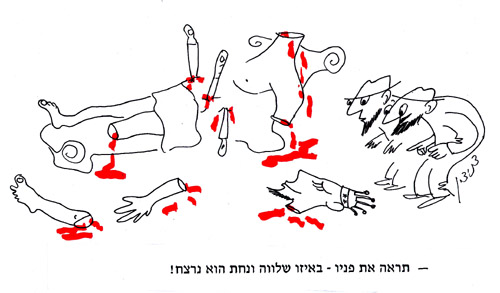
One of the sages, Rava, asked another sage: The prophet Jeremiah prophesied, in G-d’s name, that King Tzedekiah would die peacefully and be eulogized, but in fact he was exiled to Babylon by Nevuchadnezzar, his eyes were blinded, and he died in exile. Jeremiah said: “Yet hear the word of the Lord, O Tzedekiah king of Judah! Thus says the Lord concerning you: ‘You shall not die by the sword. You shall die in peace…they shall…lament for you, saying, “Alas, lord!”‘” (Jeremiah 34:4-5). This is what happened to Tzedekiah: “Then they killed the sons of Tzedekiah before his eyes, put out the eyes of Tzedekiah, bound him with bronze fetters, and took him to Babylon” (II Kings 25:7, Jeremiah 52:10-11). The sage answered him: Though Tzedekiah did die, blind and in exile, what Jeremiah meant in saying “You shall die in peace” was that Nevuchadnezzar king of Babylon would die before him, which would please Tzedekiah and cause him serenity and peace. The sage Rava continued to ask: The prophetess Chuldah foretold that King Josiah would be buried in peace and would not see the evil which would befall his land, but in fact Necco king of Egypt had him stabbed him to death with multiple sword wounds. Thus did the prophetess Chuldah say to Josiah: “Surely, therefore, I will gather you to your fathers, and you shall be gathered to your grave in peace; and your eyes shall not see all the calamity which I will bring on this place” (II Kings 22:20) and this is what happened to King Josiah: “And the archers shot King Josiah” (II Chronicles 35:23). One sage added that Josiah was wounded so many times that he ended up like a sieve. The sage answered: Though Josiah’s death was tragic, when Chuldah said “You shall be gathered to your grave in peace” she meant that the Holy Temple would not be destroyed in the days of Josiah, a fact which caused him peace and tranquility.
(Babylonian Talmud, Tractate Moed Katan 28b)
